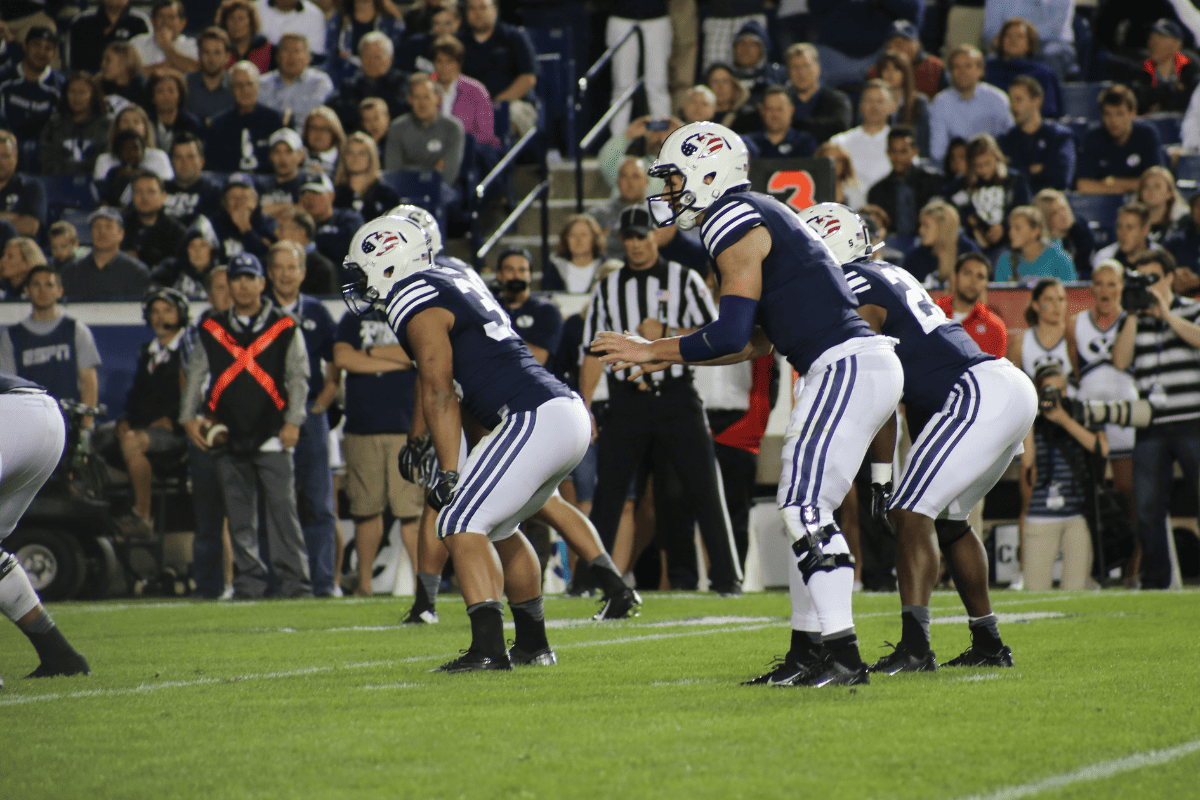Calling an Audible in Football (What, How, Why and When)
Hey there, football fans and curious readers! Ever been watching a game and seen the quarterback suddenly start shouting and waving his hands like he’s directing traffic before the ball is snapped? That, my friends, is what we call an “audible” in the game of football.
It’s not just random gibberish; it’s a critical part of the strategy that can change the course of a play, and potentially, the whole game.
An audible is like a secret code that the quarterback uses to switch up the play at the last second. Why would they do that? Maybe they see something in the defense that wasn’t expected, or perhaps the clock is ticking down, and they need to make a quick decision.
The ability to call an audible—and call it well—can make a quarterback go from good to great.
So, if you’re new to football or just want to understand what’s going on better when everyone at the sports bar starts yelling “Omaha!”, stick around. We’re going to break down what an audible is, why it’s important, and how it shakes things up on the field.
The Basics of an Audible
An audible is a last-minute change to the planned play called by the quarterback after the team has lined up on the field but before the ball is snapped. Think of it as a quarterback’s “Plan B.” If they see something they don’t like in the defense, they might decide that the original plan isn’t going to work.
When Do Quarterbacks Call Audibles?
Audibles come into play when the quarterback spots a reason to change the initial plan. It could be because:
- The defense lines up in a way that spells trouble for the play they were about to run.
- They want to take advantage of a weakness they see in the defense.
- They need to respond to a last-second change, like a teammate’s injury.
- The game clock is running low, and they need to act fast.
Key Components of an Effective Audible
Here’s what needs to happen for an audible to work:
- Quick Thinking: The quarterback has to make a snap decision, literally.
- Clear Communication: Every player on offense must understand the new play immediately.
- Flexibility: Players have to be ready to switch gears without a hitch.
How Do They Communicate It?
When calling an audible, quarterbacks use coded language—sometimes numbers, colors, or city names—to secretly tell the team what the new play is. It might go something like this:
| Code Word | Meaning |
|---|---|
| Omaha | Switch from pass to run |
| Texas | Change blocking scheme |
| Denver | Receiver route change |
In the next sections, we’ll dive into why quarterbacks call audibles and the nitty-gritty of different types that can turn a game on its head. So keep up, because this is where the real fun begins!
Reasons for Calling an Audible
Sometimes a quarterback steps up to the line of scrimmage, and things just don’t look right for the play they had in mind. Here’s why they might decide to shake things up with an audible:
Defensive Alignment Mismatches
Picture this: The offense comes out planning to run the ball, but the defense is stacked up, ready to stop the run. That’s a mismatch. The quarterback might call an audible to switch to a passing play, hoping to catch the defense off guard.
Time Constraints and Clock Management
The clock is a relentless beast in football. If it’s running out and the team needs a quick score, the quarterback might call an audible to a faster, more direct play that saves precious seconds.
Psychological Warfare
Yes, football is as much a mental game as it is physical. Sometimes a quarterback will call an audible (or even pretend to call an audible) just to mess with the defense’s heads, making them second-guess their own game plan.
Types of Audibles
Not all audibles are created equal. There are different types, each with its own purpose and effect on the game:
Run to Pass Audibles and Vice Versa
The most common type is switching between a run and a pass play or the other way around. If a QB sees that the defense is light on the front line, they might switch to a run to bulldoze through. Or, if the defense is tight, expecting a run, a quick change to a pass can be just the ticket to success.
Blocking Scheme Adjustments
The big guys up front need to know who to block. If a quarterback sees a blitz coming, they might call an audible that changes the blocking assignments to protect themselves and the play.
Route Adjustments for Receivers
Sometimes, the quarterback will adjust the routes that receivers run. This could be as simple as changing a short route to a long one or vice versa, depending on the defensive coverage they see.
Protection Audibles for Dealing with Blitzes
When the defense looks like it’s coming in hot with a blitz, the quarterback might call an audible specifically designed to give them extra protection. This could mean bringing a running back or tight end to block, so the QB has enough time to throw.
Audibles are like a game of chess played at full speed. They require players to be smart, adaptable, and on the same wavelength as their quarterback. It’s a high-stakes, high-reward situation that can lead to some of the most thrilling moments in football. Keep reading, and we’ll get into how these audibles actually unfold on the field.
The Process of Calling an Audible
Even for the casual fan, understanding the on-field ballet that leads to an audible can make watching football more exciting. Let’s walk through the steps a team takes when calling an audible:
Pre-snap Reads and Analysis
Before the ball is even snapped, the quarterback is like a detective, looking for clues in the defense’s formation. They’re reading where the defenders are lined up, who looks ready to blitz, and any mismatches they can exploit.
Quarterback’s Role and Responsibilities
The QB is the conductor of the orchestra here. Once they’ve made their read, it’s on them to communicate the new plan effectively. They’ve got to be confident, clear, and quick about it.
Using coded language or hand signals, the QB tells the offensive line, running backs, and receivers what’s about to go down. This has to be done without letting the defense in on the plan.
Ensuring Team Alignment and Understanding
Everyone on the offense must be on the same page. If one player misses the audible, it could result in a busted play. The team practices these scenarios over and over to make sure the switch is seamless.
Preparation and Training for Audibles
Teams don’t just hope they’ll get the hang of audibles by luck. They prepare meticulously, so when the time comes, everyone’s ready.
Practice makes perfect. Teams drill different audible scenarios during practice so that when they’re called in a game, players can switch without a second thought.
Teams spend hours studying film, learning the tendencies of their opponents. Quarterbacks and coaches look for patterns and tells that can help them anticipate when an audible might be needed.
During practice, teams will often run plays only to have the coach call out an audible at the last second. This simulates the game-day experience and trains players to adapt on the fly.
The Mental Training for Quarterbacks
Quarterbacks do a lot of mental gymnastics. They need to make decisions under pressure, and their choices can win or lose games. That’s why mental toughness and decision-making are key parts of their training.
Knowing how to call an audible is a valuable skill, and being prepared for it can give a team a real edge. It turns a game of brute force into one of strategy and smarts.
And for us fans? It makes the game all the more engaging to watch.
The Risk vs. Reward of Audibles
The decision to call an audible can be a high-stakes gamble. When it works, a quarterback looks like a genius. When it doesn’t, well, it can be a different story. Let’s weigh these outcomes:
Potential Benefits of a Well-Executed Audible
A good audible can lead to some major positives on the field:
- Exploiting Defensive Weaknesses: If the QB reads the defense right, an audible can turn into a big play.
- Adapting to Game Situations: It keeps the offense flexible and able to respond to unexpected situations, like penalties.
- Taking Control: It gives the offense a sense of empowerment and can be a psychological boost if they successfully counter the defense’s plan.
Possible Consequences of a Failed Audible
However, the risks are just as real:
- Confusion: If not everyone on the offense gets the message, it can result in a broken play or a penalty.
- Turnovers: A bad audible might lead to a misunderstanding, resulting in an interception or fumble.
- Wasted Opportunities: A missed chance to capitalize on a defensive weakness can swing momentum the other way.
Smart quarterbacks know how to balance these risks. They only audible when confident, and they ensure their team is prepared to make the shift with them.
Audibles in Different Football Levels
From high school fields to packed professional stadiums, audibles are a part of football at all levels. But their complexity and frequency can vary greatly:
- High School: Audibles might be simpler due to the players’ experience level and the speed of the game.
- College: As players’ understanding of the game grows, so does the sophistication of the audibles.
- Professional: In the NFL, audibles are complex, with entire games sometimes hinging on these crucial on-the-fly decisions.
With each step up in level, the details and varieties of audibles expand. Pros might have dozens of audible calls at their disposal, each with multiple variations.
Audibles Evolve with A Quarterback’s Experience
A young quarterback might start with a limited audible playbook, which grows as they gain experience and trust from the coaching staff. Seasoned QBs often have the freedom to adjust almost any aspect of the play.
Conclusion
Audibles are a dynamic aspect of football that require quick thinking, precise communication, and rigorous preparation.
As we’ve seen, the art of the audible is not just about changing a play; it’s about adapting to an ever-changing landscape, outsmarting the opponent, and sometimes, it’s about the quarterback taking the game into their own hands.
So, next time you’re watching a game and the quarterback starts calling out changes, you’ll know that you’re witnessing a critical chess move in the fast-paced game of football.

